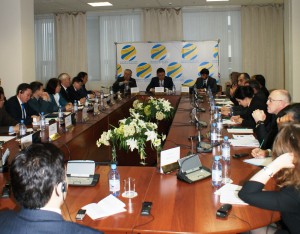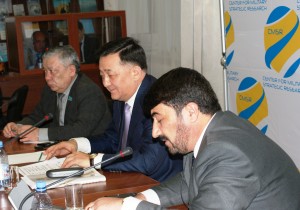 ASTANA – A roundtable discussion titled “Stability and Security in Central Asia: Cooperation between Afghanistan and Kazakhstan” took place at the National Academic Library on Dec. 11.
ASTANA – A roundtable discussion titled “Stability and Security in Central Asia: Cooperation between Afghanistan and Kazakhstan” took place at the National Academic Library on Dec. 11.
The event, attended by deputies of the Volesi Dzhirga (lower house of the Afghan parliament), headed by Vice-Speaker Mohamed Selih Saldzhuki, Ambassador of Latvia to Kazakhstan Jurijs Maklakovs, Deputy Chief of the U.S. Mission to Kazakhstan Michael Klecheski, Deputy Minister of Defence of Kazakhstan Bakhitzhan Abdraiym, military attaches of foreign countries accredited in Astana and experts, was organised by the Astana-based Centre for Military and Strategic Research.
The round table focused on a range of issues related to Afghanistan’s future development after the upcoming presidential elections and the withdrawal of the main divisions of the International Security Assistance Forces (ISAF).
Mazhilis (lower chamber of the Kazakh parliament) member Bakhitzhan Yertayev, who is a retired general and who fought in Afghanistan during the Soviet times in the 1980s, noted the success of the visit of an Afghan delegation to Kazakhstan, during which Afghan deputies visited the Ministry of Foreign Affairs and met with Afghan students studying in Astana who were invited to the country by the Kazakh government.
In his greeting speech, Saldzhuki said terrorism is not a local problem anymore as it has spread around the globe, threatening the security of many countries. Speaking about the situation in Afghanistan, he noted that the number of terrorist groups is growing mostly because of radical religious schools in the northern part of the country. Saldzhuki emphasized the importance of finding a united solution with other Central Asian states in order to solve one of the most pressing problems of the contemporary world.
“We are all concerned about the future of Afghanistan after 2014, but we continue to work to prevent the worst case scenario after the withdrawal of ISAF troops. The country is now preparing for presidential elections scheduled for April 2014 and President Karzai will oversee this process,” explained Saldzhuki.
The Afghan deputy also mentioned the necessity to modernise the Afghan Army and its armaments. Especially important is the air force, as it will assist other government bodies in retaining control over the country, he said.
Bakhitzhan Abdraiym presented Kazakhstan’s view on the issue naming two factors which hinder the further development and stabilization of the country. One area that needs the most attention in Afghanistan is the nation’s young people, he said. According to Abdraiym, they need to be educated in order to prevent them from getting brainwashed and involved with extremists.
“That’s why our government established a programme to let 1,000 young Afghan people study in Kazakhstan,” Abdraiym added.
The diverging approaches of the U.S., Russia, Pakistan and Iran in solving Afghanistan’s problems was the second factor mentioned by Abdraiym.
“It is most important for these countries to find a compromise and develop one united solution that will embrace the interests of Afghanistan and other international actors involved in the issue. Kazakhstan wants to see Afghanistan become a self-sufficient member of the international community,” Abdraiym concluded.
Ambassador-at-large of the Ministry of Foreign Affairs Timur Urazayev spoke about the transparent policy Kazakhstan is pursuing towards Afghanistan. He mentioned the Almaty Declaration that was approved in April as part of the so called Istanbul Process. It was created to promote discussion of regional issues.
“We want to involve Afghanistan in the economic life of Central Asia by establishing transport logistics projects,” Urazayev explained.
According to him, the Afghan agricultural sector should be subsidized so that crops besides cannabis are grown. He also suggested further development of cooperation between the intelligence services of two countries and that lists of suspected terrorists and information about their translocations be exchanged.
 Ambassador Maklakovs, who also represents NATO in Kazakhstan, announced NATO’s decision to continue assisting Afghanistan. He stressed that the future political and economic progress of the country will be a particularly important part in achieving stability in Afghanistan. At the same time, he made note of the visible progress made by the Afghan National Security Forces.
Ambassador Maklakovs, who also represents NATO in Kazakhstan, announced NATO’s decision to continue assisting Afghanistan. He stressed that the future political and economic progress of the country will be a particularly important part in achieving stability in Afghanistan. At the same time, he made note of the visible progress made by the Afghan National Security Forces.
“We understand that, while helping Afghanistan, we should take into account the country’s specifics. NATO is going to assist in training projects. We do not expect that stabilization will be a peaceful process, so we have to be ready for that,” concluded Maklakovs.
In his turn, Klecheski stressed U.S. commitment to the region, which will remain for many years after 2014.
“Our highest priorities will remain the same – the strengthening of Afghanistan’s sovereignty and the defeat of Al Qaeda. We see Kazakhstan as an important regional partner in all issues of regional security,” Klecheski said.
It was also noted that despite the fact that the armed forces of Afghanistan are experiencing difficulties in providing the necessary armaments, the army and the police are ready to take control over the country after the withdrawal of foreign troops. This requires the support of the international community. Saldzhuki also proposed developing a joint project to protect the borders of Afghanistan, not only in the North but also in the South.
Summing up the results of the roundtable, the president of the Centre for Military and Strategic Research, Kozy-Korpesh Karbuzov noted the need for a collective response to key threats of stability in the region. Such issues can be solved only by joint efforts based on bilateral and multilateral partnership, he added.
